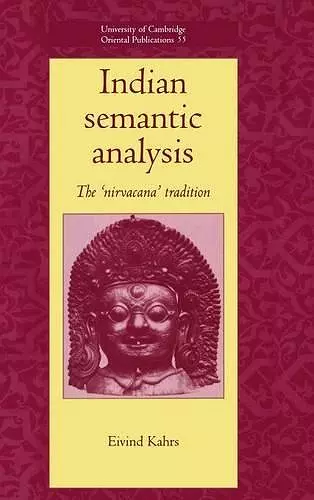Indian Semantic Analysis
The Nirvacana Tradition
Format:Hardback
Publisher:Cambridge University Press
Published:28th Mar '99
Should be back in stock very soon

The author examines the Indian tradition of semantic elucidation known as nirvacana analysis.
The Indian tradition of semantic elucidation known as nirvacana analysis represented a powerful hermeneutic tool in the exegesis and transmission of authoritative scripture. Nevertheless, it has all too frequently been dismissed by modern scholars as anything from folk-etymology to a primitive forerunner of historical linguistics. Eivind Kahrs argues that such views fall short of explaining both its acceptance within the sophisticated grammatical tradition of vyakarana and its effective usage in the processing of Sanskrit texts. He establishes his argument by investigating the learned Sanskrit literature of Saiva Kashmir and explains the nirvacana tradition in the light of a model substitution, used at least since the time of the Upanisads and later refined in the technical literatures of grammar and ritual. According to this model, a substitute (adesa) takes the place (sthana) of the original placeholder (sthanin). On the basis of a searching analysis of Sanskrit texts, the author argues that this sthana 'place' can be interpreted as 'meaning', the model thereby providing favourable circumstances for reinterpretation and change.
"...this book is a richly documented, successful effort to find a place for Yaska and the nirvacana tradition of semantic analysis that can rightly be claimed as their own. Handsomely produced, it contains all the standard resources (e.g., lists of abbreviations, bibliography, and index) expected in a first-rate scholarly work." Anthropological Linguistics
ISBN: 9780521631884
Dimensions: 229mm x 152mm x 19mm
Weight: 640g
322 pages